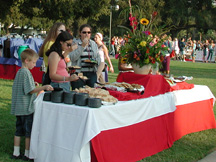 |
| Inside
Redlands is posted monthly by the Office of Public
Relations. Submissions can be sent to Monique Henderson. Deadlines for submissions are the second Monday of each month. Call (909) 335-4070 for more information. | |
Campus News Out & About Employee News Suggestion Box Memos & Announcements Press Releases Calendars Archives Contact Us |
|
Picnic The All-University Picnic and Involvement Fair was held Monday, Sept. 9 from 5 p.m. to 7 p.m. on the Quad. University employees and their families joined students as part of the event, which served as a kick-off to the new school year. A variety of food was served up by Bon Appetit, including hamburgers, pasta, vegetables and brownies.
University students attending the picnic were able to get information on ways to become more involved on campus. A number of club members from both new and established organizations handed out literature and answered students' questions during the event.
|

